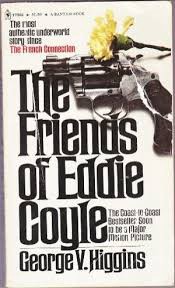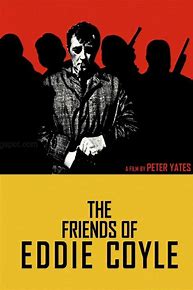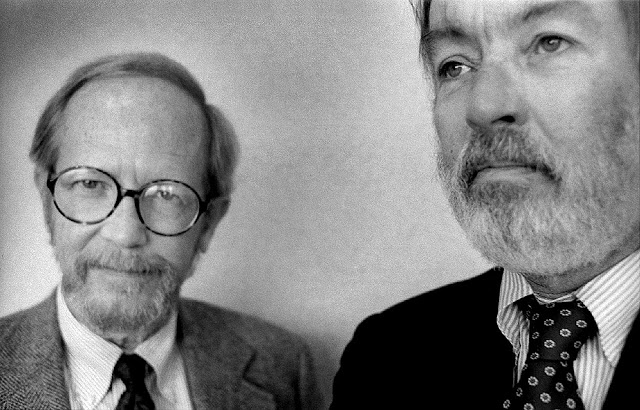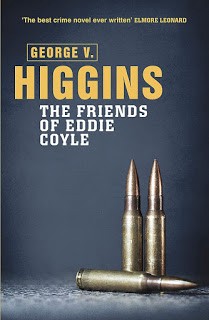Note: This essay contains spoilers. If you haven’t read the book, you’d be better off reading it first. In fact, you’d be much better off reading the book even if you never come back to this essay again. But let’s say you do read this essay first, then read the book, and then blame me for ruining for you, I have warned you. Don’t lay it on me.
 I believe I first read The Friends Of Eddie Coyle (published in 1970) when I was working on the road, before the movie came out, probably 1972, and definitely the original 1971 paperback pictured above, which is now in a box in my brother’s barn. I recall re-reading it back at my parents’ house after I’d moved to England, by which time I’d seen the brilliant movie. But since trying times call for special solutions, I came across a copy and realised as I read it for what I believe in the third time, the first in about 40 years, that this was the novel’s 50th anniversary. I’ve probably seen the film another three times since then; it is a classic that repays re-watching, and nobody can fail to be stunned by Robert Mitchum’s performance. How many books have you read in your lifetime that are memorable, unforgettable, that opened your eyes and opened doors for you, and then got made into movies just as good? Not many, I’ll reckon. But as I finished my anniversary read of the novel, anew, as it were, I was surprised by how fresh it still seemed, despite how well I thought I knew it. I say thought I knew it because I was surprised to discover I had forgotten a key, closing scene.
I believe I first read The Friends Of Eddie Coyle (published in 1970) when I was working on the road, before the movie came out, probably 1972, and definitely the original 1971 paperback pictured above, which is now in a box in my brother’s barn. I recall re-reading it back at my parents’ house after I’d moved to England, by which time I’d seen the brilliant movie. But since trying times call for special solutions, I came across a copy and realised as I read it for what I believe in the third time, the first in about 40 years, that this was the novel’s 50th anniversary. I’ve probably seen the film another three times since then; it is a classic that repays re-watching, and nobody can fail to be stunned by Robert Mitchum’s performance. How many books have you read in your lifetime that are memorable, unforgettable, that opened your eyes and opened doors for you, and then got made into movies just as good? Not many, I’ll reckon. But as I finished my anniversary read of the novel, anew, as it were, I was surprised by how fresh it still seemed, despite how well I thought I knew it. I say thought I knew it because I was surprised to discover I had forgotten a key, closing scene.
The film follows the book pretty closely, especially the dialogue. Higgins doesn’t tell as much of this story using the device he would refine and expand throughout his career: you hear it not from the author’s narration, but by listening to characters tell each other stories. The style is less pronounced than in his later books, where quotation marks would line up like soldiers on parade as one character told another character what a third had told him he said to a fourth and so on, but it’s still brilliant dialogue.
 You could still probably do a nice comparison of the Eddie Coyle book and movie to The Maltese Falcon, checking on how much of each script is verbatim from the books. There are some differences, the main one being that Dillon’s role is expanded in the film, in terms of how Jimmy Scalise gets ratted out; in the book there’s a different scenario. That’s fine with me, because it is, in effect, Peter Boyle’s Dillon who is Eddie’s ‘best’ friend; he is the repository of Higgins’ irony, and by highlighting his links with Foley, the Fed Eddie wants to be his new best friend, Peter Yates’ film puts those personal ironies, and betrayals at the story’s core.
You could still probably do a nice comparison of the Eddie Coyle book and movie to The Maltese Falcon, checking on how much of each script is verbatim from the books. There are some differences, the main one being that Dillon’s role is expanded in the film, in terms of how Jimmy Scalise gets ratted out; in the book there’s a different scenario. That’s fine with me, because it is, in effect, Peter Boyle’s Dillon who is Eddie’s ‘best’ friend; he is the repository of Higgins’ irony, and by highlighting his links with Foley, the Fed Eddie wants to be his new best friend, Peter Yates’ film puts those personal ironies, and betrayals at the story’s core.
But the scene I’d forgotten comes after Dillon whacks Coyle, for being a rat when in fact he wasn’t, and it concerns Jackie Brown, the gun dealer who had been busted because in his case Eddie was a rat. It’s the novel’s final chapter, and it begins :“Jackie Brown at twenty seven sat with no expression on his face in the first row behind the bar of the United States District Court for the District of Massachusetts.” This is beautiful, because the novel began with the famous line, which probably spurred Quentin Tarrantino to climax, “Jackie Brown at twenty six, with no expression on his face, said that he could get some guns.”
So Higgins brings us around full circle, and to Higgins this was the core of the story, that the betrayals may have carried their personal ironies and betrayal, but this is the way it goes. As Jackie Brown says: “this life’s hard, but it’s harder if you’re stupid.”
After Jackie Brown enters his plea, the rest of the chapter is a dialogue between his defense attorney and the prosecutor. They waltz around a deal, but when the lawyer, Foster Clark, sums up by saying ‘so he’s got to talk’. the nameless prosecutor, replies: “Nope, he doesn’t have to do a damned thing except decide which he wants to do more, talk, and make somebody important for us, or go down to Danbury there and get rehabilitated.” They both know the reality; Brown won’t talk, he won’t serve much time and Clark says how he’ll be back in court talking to “another bastard like you” and then he asks, “Is there any end to this shit? Does anything ever change in this racket?”
And the prosecutor takes him by the arm and says: “Hey Foss, of course it changes. Don’t take it so hard. Some of us die, the rest of us get older, new guys come along, old guys disappear. It changes every day.”
“It’s hard to notice, though,” Clark said. “It is,” the prosecutor said, “it certainly is.”
Just like the first and last chapters, the circle keeps turning and going back to the start. Being of a certain age myself now, my eyes moisten and I give myself a wry look I cannot see. And you could go and read Higgins’ last novel, At End Of Day, published in 2000, and discover that, over the space of his thirty years as a novelist, he’d realised that things had changed, and that the nameless prosecutor would probably realise that too. People who watched The Irishman were sharing a bit of that world, whether they realised it or not. But the new guys who came along when the old guys disappeared were different, and I wish Higgins had been around to write just a little more about them too.

Elmore Leonard & George V. Higgins
The cover of the 2012 British paperback edition I was reading is graced by a quote from Elmore Leonard, which I remember well: “The best crime novel ever written”. It may well be that, who knows? But it’s no surprise, 50 years old or not, The Friends Of Eddie Coyle certainly is as great as ever.
The Friends of Eddie Coyle by George V Higgins
Orion, £7.99, ISBN 978140912762

This article first appeared here